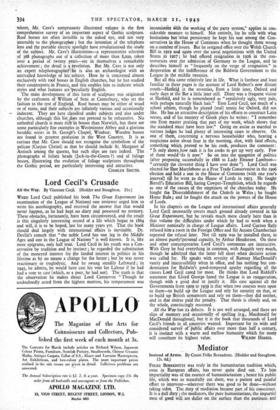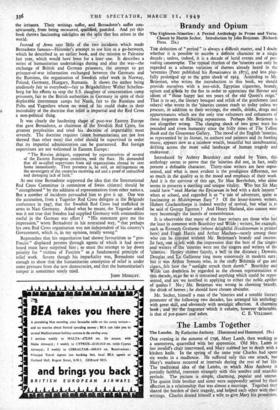Mediator
FOLKE BERNAriorris was truly in the humanitarian tradition which, even in European affairs, has never quite died out. To him impartiality was of the essence of humanitarianism ; hence his public life, which was so wastefully cut short, was a patient and painful effort to intervene—wherever there was good to be done—without taking sides. The duty of mediation became part of his conscience. It is a dull duty ; the mediators, the pure humanitarians, the impartial men of good will are duller on the surface than the partisans and
the irritants. Their writings suffer, and Bernadotte's suffer con- spicuously, from being measured, qualified, guarded. And yet this book throws fascinating sidelights on the split that has. arisen in the world.
Instead of Arms says little of the two incidents which made Bernadotte famous—Himmler's attempt to use him as a go-between, which he described in an earlier book, and the mission to Palestine last year, which would have been for a later one. It describes a series of humanitarian undertakings during and after the war—the exchange of British and German prisoners, the attempt to get prisoner-of-war information exchanged between the Germans and the Russians, the organisation of Swedish relief work in Norway, Poland, Germany, Hungary, Rumania. It shows the author being studiously fair to everybody—fair to Brigadefiihrer Walter Schellen- berg for his efforts to stop the S.S. slaughter of concentration camp prisoners, fair to the British authorities in Germany in spite of their deplorable internment camps for. Nazis, fair to the Russians and Poits and Yugoslays whom no word of his could shake in their incredulity of the doctrine that relief is impartial and the Red Cross a non-political thing.
It was clearly the hardening shape of post-war Eastern Europe that gave Bernadotte, as chairman Of the Swedish Red Cross, his greatest perplexities and tried his doctrine of impartiality_ most severely. The doctrine requires (since, humanitarians. are, not less shrewd than other men) that relief shOuld be supervised in order that its impartial administration can be guaranteed. But foreign supervisori are not welcomed in Eastern Europe: " The Russian delegate, supported by representatives of several of the Eastern European countries, took the floor. He demanded that all so-called supervisors from aid organisations abroad be sent home immediately. Their presence is, he said, an infringement on the sovereignty of the countries receiving aid and a proof of unjustified and damaging lack of faith."
At one time Bernadotte supported the idea that the International Red Cross Committee (a committee of Swiss citizens) should be " strengthened " by the addition of representatives from other natior.s. But a number of incidents persuaded him to give it up. One was the accusation, from a Yugoslav Red Cross delegate at the Belgrade conference in 1947, that the Swedish Red Cross had trafficked in arms to Nazi Germany. Asked what he meant, the Yugoslav asked was it not true that Sweden had supplied Germany with commodities useful in the German war effort ? " His statement gave me the impression," wrote Bernadotte in his restrained way, " that perhaps his own Red Cross organisation was not independent of his country's Government, which is, in my opinion, totally wrong."
Reproaches that his organiiation had shown favouritism to " pro- Fascist " displaced persons through agents of which it had never heard must have surprised him ; so must the attempt to lay down priority for " victims of Fascism " as ,a fundamental principle of relief work. Severe though his impartiality was, Bernadotte said enough to show that the humanitarian conception of relief is under some pressure from the new democracies, and that the humanitarian's







































 Previous page
Previous page